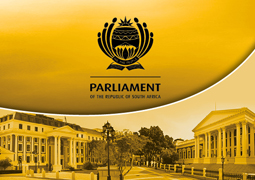
Parliament, Monday 8 July 2019 – Parliament of the Republic of South Africa, through the Standing and Select Committees on Appropriations, has invited the public to make written submissions on the 2019 Appropriation Bill, which Minister of Finance Mr Tito Mboweni tabled with the 2019 Budget on 20 February.
The Bill seeks to appropriate money from the National Revenue Fund for requirements of the state for the 2019/2020 financial year; to prescribe conditions for spending funds before commencement of the Appropriation Act for 2020/2021; and to provide for matters incidental to this.
The Money Bills Amendment Procedure and Related Matters Act, as amended (Act 9 of 2009), requires Parliament to conduct public hearings on the Bill and to report on it.
The Act gives expression to the Constitution’s requirement that: “An Act of Parliament must provide for a procedure to amend money Bills before Parliament”. It enhances Parliament’s power to amend the budget as a whole and budgets of specific national government entities. Before the Act, first passed in 2009, Parliament could approve or reject the budget, not make alterations to it. The Act also has enhanced Parliament’s oversight of executive action.
The State of the Nation Address by the President to Parliament highlights government’s priorities for the year ahead. The Minister of Finance delivers the Budget Speech and tables documents associated with the national budget. These include the Fiscal Framework and Revenue Proposals, the Division of Revenue Bill and the Appropriation Bill. These documents give details of how priorities cited in the State of the Nation Address will be funded.
In March, the fifth democratic Parliament agreed to the Fiscal Framework and Revenue Proposals. These include estimates for a particular financial year of all revenue (budgetary and extra-budgetary specified separately); all expenditure (budgetary and extra-budgetary specified separately); borrowing, interest and debt-servicing charges; and indication of the contingency reserve needed for an appropriate response to emergencies or other unforeseen needs.
The fifth democratic Parliament also agreed to the 2019 Division of Revenue Bill. This Bill, among other things, allocates funds raised nationally among the national, provincial and local spheres of government for a particular financial year and the conditions of those allocations.
The Appropriation Bill, which allocates funds to different government departments and entities of the state, could not be addressed before the election in May. The sixth democratic Parliament is now considering this Bill, through budget vote debates in mini-plenary sittings. Provisionally, these mini-plenary sittings are scheduled to culminate in a full plenary sitting of the National Assembly on 23 July. This National Assembly plenary sitting would decide on the Appropriation Bill and its votes and schedules. Once the National Assembly has agreed to the Appropriation Bill, it will be sent to the National Council of Provinces for consideration and decision.
Oversight of the budget continues after Parliament has adopted the 2019 Appropriation Bill.
During the budget cycle, government departments and entities must provide a range of planning, budgeting and reporting documentation to National Assembly committees, which use the information to draw up Budgetary Review and Recommendation Reports (BRRRs) and table them in the National Assembly. The BRRRs provide assessments of the service delivery performance of each government department, given available resources, the effectiveness and efficiency of the departments’ use and further allocation of resources. The Minister of Finance must take the BRRRs into account when developing the national budget for the next financial year.
In October, the Minister of Finance is expected to present the Medium Term Budget Policy Statement (MTBPS) to Parliament. The MTBPS sets out government’s three-year financial plans, communicates the economic context and provides for the estimated revenue and expenditure for the following three years.
The MTBPS makes it possible for Parliament and the public to participate in the budget process ahead of the formulation of the national budget. Plenary sittings of the two Houses of Parliament make decisions on a Division of Revenue Amendment Bill and an Adjustments Appropriation Bill. The adjusted budget provides the Minister of Finance and Parliament with an opportunity to make adjustments to the budget for unforeseeable and unavoidable conditions.
ISSUED BY THE PARLIAMENT OF THE REPUBLIC OF SOUTH AFRICA
Enquiries: Moloto Mothapo 082 370 6930

